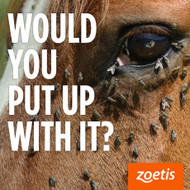How to Control Flies in Horses
Posted by Ben Watson on 1st Jun 2024
Fly Control in Horses
Fly control is an important part of caring for your horse. Not only are flies irritating, but they can carry diseases and viruses that can potentially be dangerous.
There are a range of different methods to control flies for horses, and the best approach will vary depending on the individual horse and the environment. Learn more about horse fly control and our professional tips below.
Types of Flies that Can Affect Horses
Different species of flies make their home in the UK, including:
- House flies
- Horse flies
- Black flies
- Blow flies
- Bot flies
- Mosquitoes
- Midges
Dangers of Fly Bites
Ignoring the flies and letting your horse suffer can uncover a range of risks. These include:
- Itching
- Inflammation
- Sores
- Rash
- Hair loss
- Sweet itch (a debilitating allergic condition)
- Conjunctivitis (pinkeye)
- Headshaking
How to Control Flies
Before you reach for the fly swatter (your horse definitely wouldn’t appreciate it), there are plenty of measures you can do to keep flies away from your horses:
Picking Up the Poo
None of us enjoy it, but keeping your horse's stable clean and free of manure and other debris will take away the feeding and breeding ground for lots of flies, helping to keep numbers down. This means it’s especially important to keep on top of the stable chores in spring and summer when horse flies are prevalent.
Similarly, regular poo picking in the field can be back breaking work, but it will discourage flies.
Standing Water
Removing standing water from your horse's environment and refilling any troughs daily will take away another fly breeding ground – plus your horse will be grateful for the constant supply of fresh water.
Planting Fly-repellent Plants Around Your Horse's Stable
There are plenty of fly repellent plants that are safe for horses. Our favourites include lavender, marigolds and catnip! Just be sure to plant them behind a fence so your horse doesn’t eat your gardening efforts.
Using Fly Traps and Other Fly Control Devices
They’re gross but highly effective. A fly catcher above your stables will soon fill up, trapping up to 20,000 flies per trap that would have otherwise been snacking on your horse.
Adding Garlic to Your Horse’s Feed
Garlic is one of the most used herbs in the horse industry for a reason. It’s great for horses, rich in selenium and sulphur. However, it’s also thought that when a horse feeds on garlic (even better if it’s wild garlic) they give off an odour in their sweat that helps keep flies, ticks and midges away.
The easiest way to achieve this is to add garlic to their feed, but if you feel like giving your horse a treat, there are garlic salt licks for that added protection.
Using Fly Rugs For Horses
Fly rugs are an excellent way to keep your horse cool whilst providing a mesh protection from every type of fly. There’s a huge range of practical fly rugs to choose from, some even include belly flaps and hoods for added coverage. We’d also recommend investing in a horse fly mask to protect their eyes.
Fly Sprays For Forses
Finally, we recommend fly sprays to help protect your horse. An insect’s worst nightmare, it’s possible to buy all natural fly sprays that still repel insects off your horse.
Apply liberally to your horse in the summer months to keep flies away. If you’re going riding, we recommend spraying your own clothes too if you want to be fly free – but don’t spray your riding helmet! It gives the flies somewhere to go that isn’t your horse, and you won’t notice while you’re wearing it.
Consult with Your Veterinarian
If you are concerned about fly control for your horse, you should consult with your veterinarian. They can help you develop a fly control plan that is safe and effective for your horse.
For More Information
For more information on fly control in horses, please visit the Hyperdrug website.

